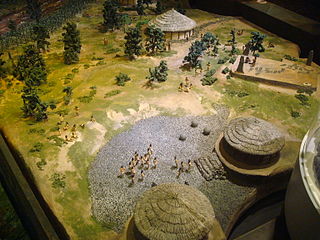
The first indigenous peoples of Costa Rica were hunters and gatherers, and when the Spanish conquerors arrived, Costa Rica was divided in two distinct cultural areas due to its geographical location in the Intermediate Area, between Mesoamerican and the Andean cultures, with influences of both cultures.
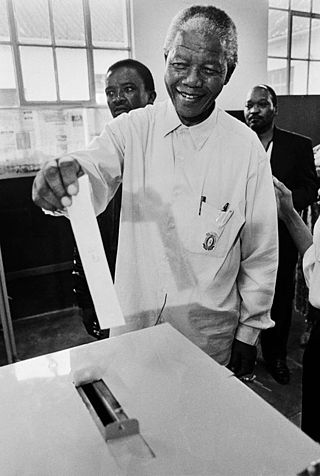
Democracy is a system of government in which state power is vested in the people or the general population of a state. Under a minimalist definition of democracy, rulers are elected through competitive elections while more expansive definitions link democracy to guarantees of civil liberties and human rights in addition to competitive elections.

Francis Yoshihiro Fukuyama is an American political scientist, political economist, international relations scholar, and writer.

A government is the system or group of people governing an organized community, generally a state.

A communist state, also known as a Marxist–Leninist state, is a one-party state that is administered and governed by a communist party guided by Marxism–Leninism. Marxism–Leninism was the state ideology of the Soviet Union, the Comintern after Bolshevisation and the communist states within the Comecon, the Eastern Bloc, and the Warsaw Pact. Marxism–Leninism currently still remains the ideology of a few parties around the world. After its peak when many communist states were established, the Revolutions of 1989 brought down most of the communist states, however, it is still the official ideology of the ruling parties of China, Cuba, Laos, Vietnam, and to a lesser extent, North Korea. During most of the 20th century, before the Revolutions of 1989, around one-third of the world's population lived under communist states.

Foreign policy, also known as external policy, is the set of strategies and actions a state employs in its interactions with other states, unions, and international entities. It encompasses a wide range of objectives, including defense and security, economic benefits, and humanitarian assistance. The formulation of foreign policy is influenced by various factors such as domestic considerations, the behavior of other states, and geopolitical strategies. Historically, the practice of foreign policy has evolved from managing short-term crises to addressing long-term international relations, with diplomatic corps playing a crucial role in its development.
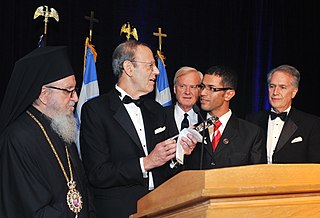
The National Endowment for Democracy (NED) is a quasi-autonomous non-governmental organization in the United States founded in 1983 to advance democracy worldwide, by promoting political and economic institutions, such as political groups, trade unions, free markets, and business groups.

Democratization, or democratisation, is the structural government transition from an authoritarian government to a more democratic political regime, including substantive political changes moving in a democratic direction.
The Westminster Foundation for Democracy (WFD) is a United Kingdom non-departmental public body set up to support democratic institutions overseas. It was established on 26 February 1992 and registered as a company limited by guarantee in the UK. It receives funding from the Foreign and Commonwealth Office (FCO) and the Department for International Development (DFID), which were merged into the Foreign, Commonwealth, and Development Office (FCDO) in September 2020.
Modernization theory holds that as societies become more economically modernized, wealthier and more educated, their political institutions become increasingly liberal democratic. The "classical" theories of modernization of the 1950s and 1960s, most influentially articulated by Seymour Lipset, drew on sociological analyses of Karl Marx, Emile Durkheim, Max Weber, and Talcott Parsons. Modernization theory was a dominant paradigm in the social sciences in the 1950s and 1960s, and saw a resurgence after 1991, when Francis Fukuyama wrote about the end of the Cold War as confirmation on modernization theory.

The Solidarity Center is a non-profit organization aligned with the AFL–CIO labor federation. It is one of the core grantees of the National Endowment for Democracy.
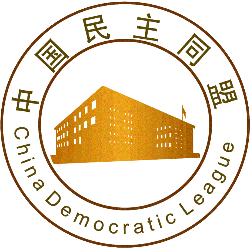
The China Democratic League (CDL) is one of the eight minor political parties in the People's Republic of China under the direction of the Chinese Communist Party. The CDL was originally founded in 1941 as an umbrella coalition group of the Chinese National Socialist Party, the Chinese Youth Party and the Chinese Peasants' and Workers' Democratic Party to fight the Imperial Japanese Army while providing for a "Third Force".

Seymour Martin Lipset was an American sociologist and political scientist. His major work was in the fields of political sociology, trade union organization, social stratification, public opinion, and the sociology of intellectual life. He also wrote extensively about the conditions for democracy in comparative perspective. He was president of both the American Political Science Association (1979–1980) and the American Sociological Association (1992–1993). A socialist in his early life, Lipset later moved to the right, and was considered to be one of the first neoconservatives.

The Democracy Index published by the Economist Group is an index measuring the quality of democracy across the world. This quantitative and comparative assessment is centrally concerned with democratic rights and democratic institutions. The methodology for assessing democracy used in this democracy index is according to Economist Intelligence Unit which is part of the Economist Group, a UK-based private company, which publishes the weekly newspaper The Economist. The index is based on 60 indicators grouped into five categories, measuring pluralism, civil liberties, and political culture. In addition to a numeric score and a ranking, the index categorizes each country into one of four regime types: full democracies, flawed democracies, hybrid regimes, and authoritarian regimes. The first Democracy Index report was published in 2006. Reports were published every two years until 2010 and annually thereafter. The index includes 167 countries and territories, of which 166 are sovereign states and 164 are UN member states. Other democracy indices with similar assessments of the state of democracy include V-Dem Democracy indices or Bertelsmann Transformation Index.
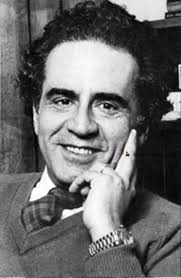
Guillermo Alberto O'Donnell Ure was a prominent Argentine political scientist who specialized in comparative politics and Latin American politics. He spent most of his career working in Argentina and the United States, and who made lasting contributions to theorizing on authoritarianism and democratization, democracy and the state, and the politics of Latin America. His brother is Pacho O'Donnell.
Authoritarianism is a political system characterized by the rejection of democracy, and political plurality. It involves the use of strong central power to preserve the political status quo, and reductions in the rule of law, separation of powers, and democratic voting. Political scientists have created many typologies describing variations of authoritarian forms of government. Authoritarian regimes may be either autocratic or oligarchic and may be based upon the rule of a party or the military. States that have a blurred boundary between democracy and authoritarianism have some times been characterized as "hybrid democracies", "hybrid regimes" or "competitive authoritarian" states.
A democratic republic is a form of government operating on principles adopted from a republic and a democracy. As a cross between two similar systems, democratic republics may function on principles shared by both republics and democracies.
The Chinese Communist Party (CCP) frames its ideology as Marxism adapted to the historical context of China, often expressing it as socialism with Chinese characteristics. Major ideological contributions of the CCP's leadership are viewed as "Thought" or "Theory," with "Thought" carrying greater weight. Influential concepts include Mao Zedong Thought, Deng Xiaoping Theory, and Xi Jinping Thought. Other important concepts include the socialist market economy, Jiang Zemin's idea of the Three Represents, and Hu Jintao's Scientific Outlook on Development.












